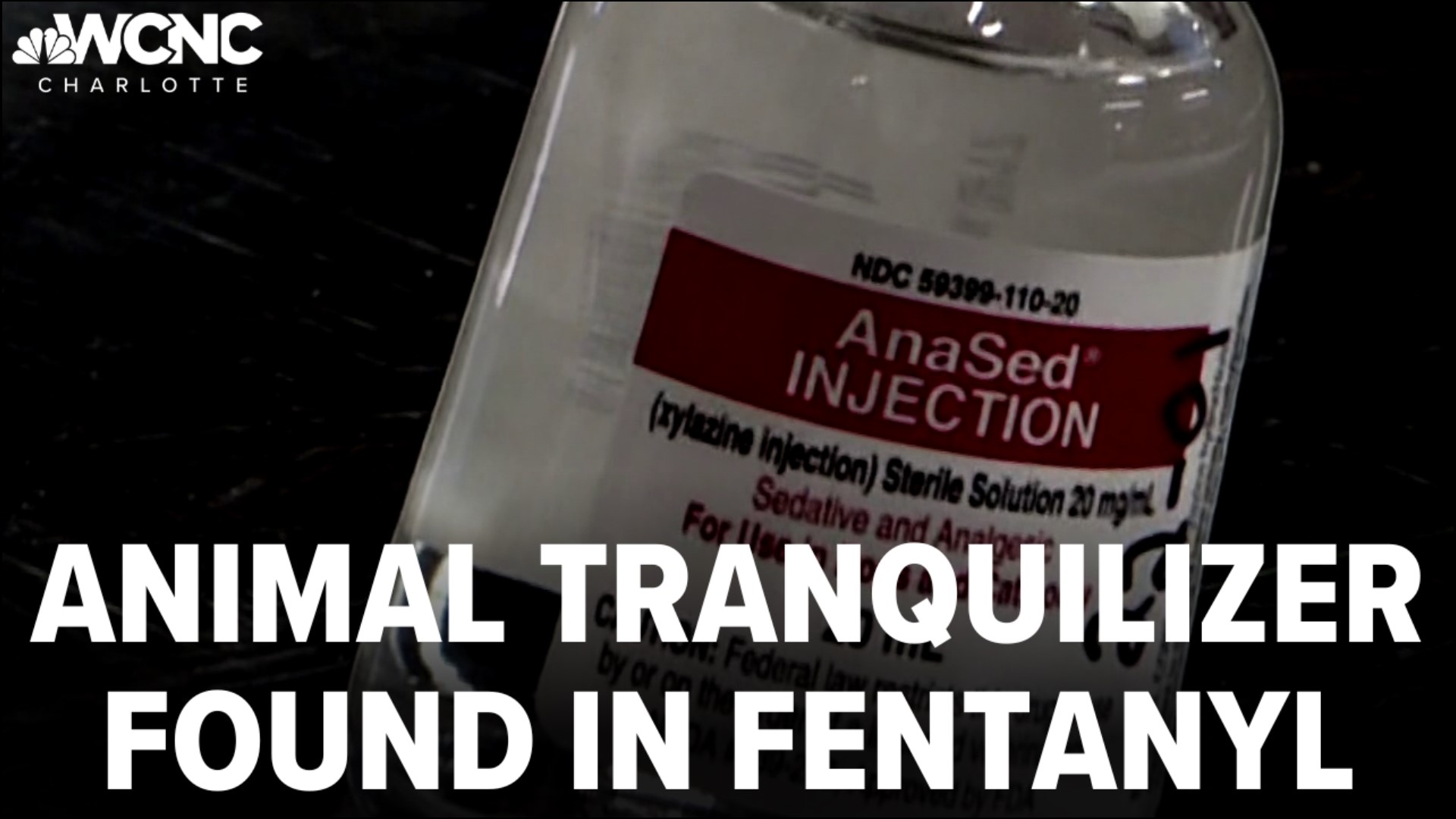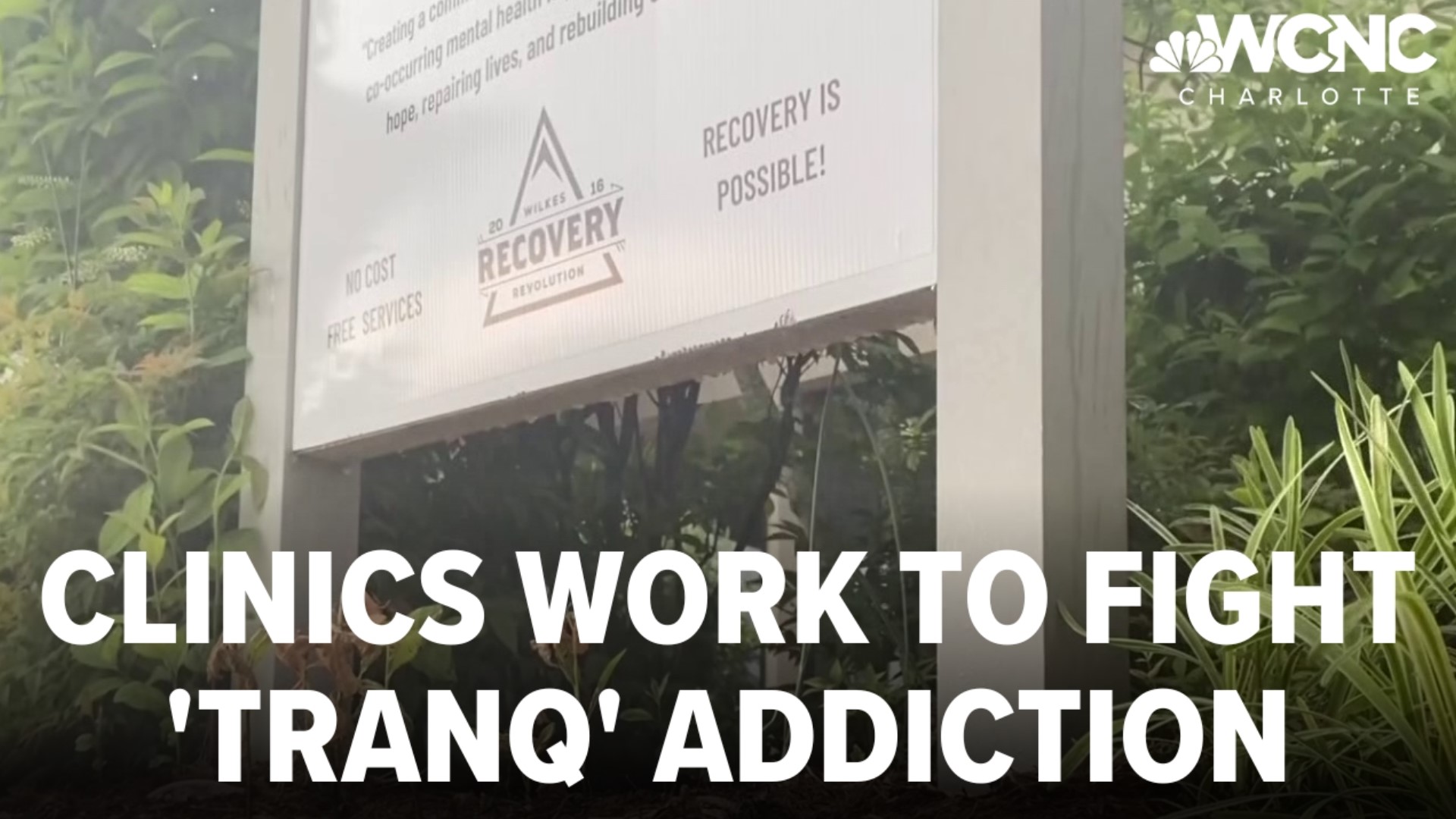CHARLOTTE, N.C. — Drug dealers are selling fentanyl in the form of powders and pills, but now they're adding a dangerous animal tranquilizer to it. It's called "xylazine." On the street, it's known as "tranq."
(Warning: Story contains graphic details)
The start
When ingested by humans, the effects could be deadly. The DEA released shocking statistics about xylazine and how it's making its way through the U.S., and data shows it's in North Carolina.
Colin Miller is an expert on the drug and works with the UNC Street Drug Analysis Lab in Chapel Hill.
“It was really only on the island of Puerto Rico for over a decade," Miller said.
He said xylazine is a powerful sedative and pain reliever. In the early 2000s, it was an epidemic sweeping the island.
“You didn’t hear about xylazine being cut into drugs [in] other places," Miller said.
Dealers are cutting street drugs like fentanyl and heroin with xylazine. It's a way to stretch the supply. It makes it more affordable for the dealer to buy and it's cheaper to buy for the user. When ingesting the drug, it creates a strong high for the user.
"In humans, it seems to slow blood pressure down, it can really kind of make people very drowsy or straight up unconscious," Miller said.
HELP IS AVAILABLE: Addiction resources in and around the Charlotte area
In the worst cases, the drug creates open sores or wounds on the human body. The wounds are deep to where, in some cases, you can see bone. These wounds can take months to heal.
“It starts with sort of a black patch under the skin and almost like a blister with a lot of fluid in it, and then from there that blister with fluid kind of breaks, and then a thick scab known as eschar forms over that wound," Miller said.
The DEA issued a warning about humans ingesting tranq. Human consumption is a far cry from the intended use.
Dr. Samantha Stanley, a veterinarian in Charlotte, is very familiar with xylazine. She told WCNC Charlotte it is most commonly used in horses. She said the drug is dangerous and is only given to animals under careful observation.
"Ideally we would be monitoring blood pressure, heart rate, respiratory rate -- because that’s what these drugs do, is they decrease those things, and if they get too low that potentially can be deadly," Stanley said.
Now, humans are ingesting it and many don't even know it.
“I guess I wasn’t surprised,” Stanley said.
It's been added to a list of other veterinary drugs, like fentanyl in canine cases, that are misused by people.
"I don't carry fentanyl anymore because owners have abused it," Stanley said. "A large majority of them are starting to get controlled and starting to be abused.”
From Puerto Rico, xylazine moved to the mainland.
Xylazine lands in the U.S.
The Kensington area is the largest open-air drug market in the Northeast. Fentanyl and heroin plague the area, but now xylazine is in the area.
According to data by Substance Abuse Philly, in 2021 over 90% of drug samples taken in Philadelphia contained tranq.
"There’s a lot of Puerto Ricans and Dominicans in the drug trade in Philadelphia," Miller said.
The National Institute on Drug Abuse ran and report. The report showed in Pennsylvania, where the drug first landed, the percentage of all overdose deaths involving xylazine increased from 2% in 2015 to 26% in 2020. That's a 1300% increase in just five years.
Now, Miller said, those cases are bleeding into where we live.
Xylazine in the Carolinas
At UNC-Chapel Hill, you'll find the street drug analysis lab. A team of experts tests samples off the streets. They can identify what is really in each drug.
It's one of the few labs testing for xylazine.
"A lot of people aren't aware that this is being cut into the fentanyl that they're using," Miller said. "We work with agencies across the state. They can tell their participants to bring in residue in a corner of a baggy or a used cotton from an injection."
According to the lab, as of May 2023, out of 551 samples taken over the last year, 130 came back positive for tranq. That's almost 25%.
“North Carolina is more than likely headed for where we see Philadelphia," Miller said.
The drug has been found in over a dozen counties in North Carolina.


Across state lines into South Carolina, the Lancaster County Sheriff's Office issued a warning about xylazine with a frightening footnote. Because xylazine is not an opioid, its deadly effects cannot be reversed by using Narcan. Narcan is the standard antidote for these kinds of overdoses.
"It might restore their breathing but they might still be unconscious," Miller said.
WCNC Charlotte reached out to the Charlotte-Mecklenburg Police Department's Vice Unit and asked for an interview multiple times. We explained to the department there have been cases linked back to Mecklenburg County. The department declined.
At first, it was a problem beneath the surface. Xylazine is now in the Carolinas, as loud as the streets where it originated.
What treatment centers are seeing
In Wilkesboro, it's a beautiful afternoon when WCNC Charlotte visits. Cars drive down the main street and the sounds of birds overtake the area. But then, once clear skies were overtaken by dark storm clouds. The rain started the fall hard; it was unexpected.
Inside the Wilkes Recovery Revolution, they are experiencing a different kind of storm.
Amanda Hooper is the operations director at Wilkes Recovery Revolution and works with people who have substance abuse disorder.
"No one is prepared for it," Hooper said. “I heard about it. It wasn’t a thing. It wasn’t in our community and then bam, it was -- like overnight.”
She spends a lot of her time organizing supplies, which has become the norm after xylazine made its way into the Carolinas.
“I've seen an uptick in the last month," Ericka Minton, harm reductionist at Wilkes Recovery Revolution, said. "Whether that’s fentanyl, heroin, pain pills -- I mean it’s getting into everything."
More and more people are coming in with those large wounds.
"It’s sad, those wounds are so gnarly," Hooper said.
Right now, she said the center is on damage control.
"Wound care is not enough but I don’t know what is enough at this point," Hooper said. "I don't know what the answer is but we're doing the best we can."
Similar to the wounds on the body, the cost of supplies is eating away at the center. On top of that, because the drug is newer, testing for it is hard to come by. Unlike the fentanyl test strips, the xylazine tests are more expensive.
“Our fentanyl test strips are about $1 a strip, xylazine test strips are $2 so we're working on funding," Hooper said.
Many of those who use these street drugs are among our homeless community. Another issue is when a person who goes to seek shelter if they have an open wound from xylazine, they might be turned away over the fears of spreading disease.
"That's crazy to me, I feel sad for them that these barriers are in place, and they can’t get their basic needs met because of it," Hooper said.
With limited information, Hooper said they are left trying to do the best they can.
"We are still not prepared," Hooper said. "We have no clue looking forward where this thing can go."
Hooper said they are trying to get by and are waiting for the clouds to part, weathering the storm.
Contact Austin Walker at awalker@wcnc.com and follow him on Facebook, Twitter, and Instagram.
WCNC Charlotte is committed to reporting on the issues facing the communities we serve. We tell the stories of people working to solve persistent social problems. We examine how problems can be solved or addressed to improve the quality of life and make a positive difference. WCNC Charlotte is seeking solutions for you. Send your tips or questions to newstips@wcnc.com.


